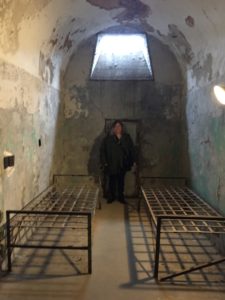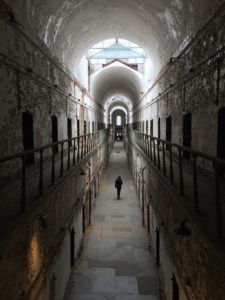Prisons are not exactly the most romantic spots in the world. Not that I haven’t read any good prison romances, because I have. But as a location for letting love bloom, the state pen is never going to rival that long sandy beach or a cozy mountain cabin.
One aspect of prison life has caught some people’s attention, however: conjugal visits. But it turns out that the reality is a lot less sexy than most people think.
For one thing, they have a racist past. They originated in Mississippi a hundred years ago, when a white prison warden figured sex was a good way to encourage black prisoners to work harder. The warden paid prostitutes to visit once a week, and inmates who’d pleased the guards got to take part.
As time passed, however, the reasoning behind conjugal visits changed, and they became more about maintaining family ties than about sex. In fact, some places renamed them extended-family visits to emphasize the involvement of inmates’ children, parents, siblings, and other relatives. Researchers found that the visits meant inmates’ family members were more likely to maintain contact with them while they were incarcerated. And once released, ex-cons who maintained those ties were less likely to reoffend. So what seems like a perk for the prisoner can also, arguably, benefit society as a whole.
Nonetheless, by the 1980s there was a strong movement to make prisons more punitive. Prisons did away with all sorts of things that the public viewed as pampering the inmates, including exercise facilities and education (never mind that many of these things help reduce recidivism). As a result, most states did away with conjugal visits entirely. Today only four states permit them: California, Connecticut, New York, and Washington.
Even in those few states that permit conjugal visits, not all inmates are eligible. Participants have to be relatively low risk and well behaved. Neither are all visitors eligible. If the visitor has a criminal record, he or she likely won’t be allowed. Those visitors who are allowed have to go through intrusive searches to make sure they’re not smuggling anything in. Those inmates who do get visits won’t get them often—usually just a couple of times a year at most. And the visits won’t necessarily last overnight.
Conjugal visits usually take place in separate facilities on the prison grounds, sometimes trailers and sometimes hotel-like facilities. They often include kitchens to allow prisoners to cook with their family members. They also generally include condoms. There’s no regular audio or video surveillance during the visit (although cameras may be present in case of emergency).
Most prisons require that visitors for conjugal visits be close relatives or spouses. Prison policies now allow conjugal visits by same-sex spouses or registered domestic partners, but as you might imagine, this is a relatively new change.
So if you have been imagining a conjugal visit as a good opportunity for sexy times between your characters, think carefully about whether the visit would even be available and keep all the limitations in mind. It might, however, provide a good chance for your people to have a private chat outside the supervision of prison officials. I wonder what they’re going to talk about.
 ESP was isolated from the rest of Philadelphia when first built, but the city soon grew around it. It’s only about a mile or so from the city center.
ESP was isolated from the rest of Philadelphia when first built, but the city soon grew around it. It’s only about a mile or so from the city center.





